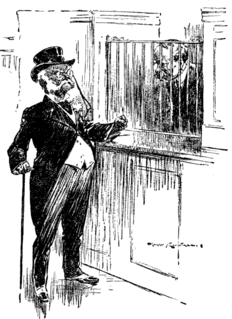A commercial bank is a type of bank that provides services such as accepting deposits, making business loans, and offering basic investment products that is operated as a business for profit.
A credit risk is the risk of default on a debt that may arise from a borrower failing to make required payments. In the first resort, the risk is that of the lender and includes lost principal and interest, disruption to cash flows, and increased collection costs. The loss may be complete or partial. In an efficient market, higher levels of credit risk will be associated with higher borrowing costs. Because of this, measures of borrowing costs such as yield spreads can be used to infer credit risk levels based on assessments by market participants.

Financial services are the economic services provided by the finance industry, which encompasses a broad range of businesses that manage money, including credit unions, banks, credit-card companies, insurance companies, accountancy companies, consumer-finance companies, stock brokerages, investment funds, individual managers and some government-sponsored enterprises. Financial services companies are present in all economically developed geographic locations and tend to cluster in local, national, regional and international financial centers such as London, New York City, and Tokyo.

A payday loan is a small, short-term unsecured loan, "regardless of whether repayment of loans is linked to a borrower's payday." The loans are also sometimes referred to as "cash advances," though that term can also refer to cash provided against a prearranged line of credit such as a credit card. Payday advance loans rely on the consumer having previous payroll and employment records. Legislation regarding payday loans varies widely between different countries, and in federal systems, between different states or provinces.

A prime rate or prime lending rate is an interest rate used by banks, usually the interest rate at which banks lend to favoured customers—i.e., those with good credit. Some variable interest rates may be expressed as a percentage above or below prime rate.

A loan shark is a person who offers loans at extremely high interest rates, has strict terms of collection upon failure, and operates outside off the street. Loan sharking is usually illegal, but may be predatory lending with extremely high interest rates such as payday or title loans.
Predatory lending refers to unethical practices conducted by lending organizations during a loan origination process that are unfair, deceptive, or fraudulent. While there are no legal definitions in the United States for predatory lending per se, a 2006 audit report from the office of inspector general of the Federal Deposit Insurance Corporation (FDIC) broadly defines predatory lending as "imposing unfair and abusive loan terms on borrowers", though "unfair" and "abusive" were not specifically defined. Though there are laws against some of the specific practices commonly identified as predatory, various federal agencies use the phrase as a catch-all term for many specific illegal activities in the loan industry. Predatory lending should not be confused with predatory mortgage servicing which is mortgage practices described by critics as unfair, deceptive, or fraudulent practices during the loan or mortgage servicing process, post loan origination.
Universal default is the term for a practice in the financial services industry in the United States for a particular lender to change the terms of a loan from the normal terms to the default terms when that lender is informed that their customer has defaulted with another lender, even though the customer has not defaulted with the first lender.

An overdraft occurs when money is withdrawn from a bank account and the available balance goes below zero. In this situation the account is said to be "overdrawn". If there is a prior agreement with the account provider for an overdraft, and the amount overdrawn is within the authorized overdraft limit, then interest is normally charged at the agreed rate. If the negative balance exceeds the agreed terms, then additional fees may be charged and higher interest rates may apply.
Payment protection insurance (PPI), also known as credit insurance, credit protection insurance, or loan repayment insurance, is an insurance product that enables consumers to ensure repayment of credit if the borrower dies, becomes ill or disabled, loses a job, or faces other circumstances that may prevent them from earning income to service the debt. It is not to be confused with income protection insurance, which is not specific to a debt but covers any income. PPI was widely sold by banks and other credit providers as an add-on to the loan or overdraft product.

A line of credit is a credit facility extended by a bank or other financial institution to a government, business or individual customer that enables the customer to draw on the facility when the customer needs funds. A line of credit takes several forms, such as an overdraft limit, demand loan, special purpose, export packing credit, term loan, discounting, purchase of commercial bills, traditional revolving credit card account, etc. It is effectively a source of funds that can readily be tapped at the borrower's discretion. Interest is paid only on money actually withdrawn. Lines of credit can be secured by collateral, or may be unsecured.
The following article is based on UK market, other countries may differ.
Tacking is a legal concept arising under the common law relating to competing priorities between two or more security interests arising over the same asset. The concept is best illustrated by way of example.
- Bank A lends a first advance to the borrower, which is secured by a mortgage over the borrower's property. The mortgage is expressed to secure this advance and any future advances.
- Bank B subsequently lends more money to the borrower and takes a second ranking mortgage over the same property.
- Bank A then subsequently lends a second advance to the borrower, relying on its original mortgage.
The term bank charge covers all charges and fees made by a bank to their customers. In common parlance, the term often relates to charges in respect of personal current accounts or checking account. These charges may take many forms, including:

A bank is a financial institution that accepts deposits from the public and creates credit. Lending activities can be performed either directly or indirectly through capital markets. Due to their importance in the financial stability of a country, banks are highly regulated in most countries. Most nations have institutionalized a system known as fractional reserve banking under which banks hold liquid assets equal to only a portion of their current liabilities. In addition to other regulations intended to ensure liquidity, banks are generally subject to minimum capital requirements based on an international set of capital standards, known as the Basel Accords.
Unfair or Deceptive Acts or Practices is a proposal for bank regulation in the United States under Federal Reserve Regulation AA. The Board of Governors of the Federal Reserve System announced in a press release on Saturday, May 2, 2008 that the proposed rules, "prohibit unfair practices regarding credit cards and overdraft services that would, among other provisions, protect consumers from unexpected increases in the rate charged on pre-existing credit card balances." Provisions addressing credit card practices aim to enhance protections for consumers who use credit cards and improve the credit card disclosures under the Truth in Lending Act:

Wonga.com, also known as Wonga, is a British payday loan provider of "short-term, high-cost credit" that was founded in 2006 and has operations in the United Kingdom, Spain, Poland and South Africa. It is a trading name used by Wonga Group Limited, operating through WDFC UK Limited in the UK, and Wonga Worldwide Limited in the rest of the world.








